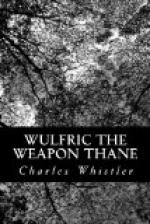“So, brother,” he said, when I left off speaking, “had I gone to Reedham there would have been burnt houses in East Anglia.”
“In Reedham?” said I.
“Wherever this Beorn had a house; and at Caistor where that old fool Ulfkytel lives, and maybe at one or two other places on the way thither. And I think your father and Egfrid your brother would have helped me, or I them.”
So he doubted me not at all, any more than I should have doubted his tale, were he in my place and I in his.
Then I said that I myself had no grudge against Earl Ulfkytel, for he had sent me here.
“Why then, no more have I,” answered Halfden; “for he is a wiseacre and an honest one, and maybe meant kindly. Ingvar would have slain both guilty and innocent, and told them to take their wrangle elsewhere, to Hela or Asgard as the way might lead them.”
Now as he said that, I, who looked ever on the face of her whom I loved, saw that a new fear had come into Osritha’s heart, and that she feared somewhat for me. Nor could I tell what it was. But Halfden and I went on talking, and at last she could not forbear a little sob, and at that Halfden asked what ailed her.
“May I speak to you, my brother, very plainly, of one thing that I dread?” she asked, drawing closer to him.
“Aye, surely,” he answered in surprise.
“Remember you the words that Ingvar said to the priest of the White Christ who came from Ansgar at Hedeby {xv}, while our father was away in the ships?”
“Why, they were like words. He bade him go and settle the matter with Odin whom he would not reverence, and so slew him.”
“Aye, brother. And he said that so he would do to any man who would not honour the gods.”
“Why do you remember that, Osritha?”
“Because—because there will be the great sacrifice tomorrow, and Wulfric, your friend, is not of our faith.”
Then Halfden was silent, looking across at me, and all at once I knew that here was a danger greater than any I had yet been through. Fire I had passed through, and water, and now it was like to be trial by steel. And the first had tried my courage, and the next my endurance, as I thought; but this would try both, and my faith as well.
“That is naught,” said Halfden, lightly. “It is but the signing of Thor’s hammer, and I have seen Wulfric do that many a time, only not quite in our way, thus;” and he signed our holy sign all unknowing, or caring not. “And to eat of the horse that is sacrificed—why, you and I, Wulfric, did eat horse on the Frankish shores; and you thought it good, being nigh starved—you remember?”
I remembered, but that was different; for that we did because the shores were so well watched that we ran short of food, and had to take what we could under cover of night at one time. But this of which Osritha spoke was that which Holy Writ will by no means suffer us to do—to eat of a sacrifice to idols knowingly, for that would be to take part therein. Nor might I pretend that the holy sign was as the signing of Thor’s Hammer.




